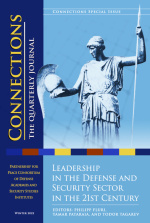Leadership is the art of dealing with people.
When the call for articles for this special issue on leadership in the 21st century was sent out, personalized leadership seemed to be out of fashion and on the decline. The world seemed to be ruled by a networked International Organization, and this, again, including NATO, seemed to function like a well-oiled machine, with people at the various helms playing the roles of figureheads more than leaders in a classical fashion. And these well-paid positions could now be filled equitably with all the representatives of the human zoo.
Many of yesterday’s wisdoms in the defense and security field seemed obsolete. The old guard of arms control experts on all sides was gone and had not been replaced, and so were Cold War-experienced NATOans and first-generation EU politicians. Institutions once leading in the global security domain like the SIPRI (Stockholm International Peace Research Institute) and the GCSP (Geneva Centre for Security Policy) apparently no longer felt a need to invest much into the analysis of “hard” security, as the network, the globalized market, and the International Organization seemed to be taking care of security—like an invisible hand—as well. In the wake of globalization, authoritarians (some of them coldly charismatic) mingled freely with leading figures of the free world, the boundaries of the free and the unfree world having become blurred. The democracy project lost attraction and steam.
In the meantime, the voluntarily myopic and conditioned helpless have been called to order by Mr. V.V.Putin, and history as told by him, and written in blood and ashes. Mr. Putin wanted a reordering of the international system, and a reordering of the international system he will obtain.
This special issue looks at leadership in different spheres of life. It is the first in what could likely become a series of reflections on leadership. It is thus by no means comprehensive nor aspires to completeness. It is rather like the proverbial stone thrown into to water to see what ripples and waves it may create and reflects the different interests and specializations of the contributors. While the original intention of the editors had been to encourage contributions from the Euro-Atlantic defense and security community, articles now reflect research from a much wider defense and security theater.
At the time of the publication of this special issue, Russia’s President Putin decided to invade Ukraine and bring death and destruction to a country that was just about to overcome its post-Soviet legacy of hesitant nation-building, lagging transparency, and an oligarch-controlled economy. And create credible welfare for its people, and that therefore posed a challenge to Putin’s Russia, whose fossil energy-based economy is in decline. No amount of intervention in neighboring countries, last in the Caucasus, Kazakhstan, and on behalf of the self-declared President of Belarus can divert from the fact that Mr. Putin is a “failed leader,” [1] having turned to repression, fearmongering, and deception to hold his faltering empire together.
As both the Belarussian and the Ukrainian electorate, re-enforced by a whole generation growing up after the Soviet Union collapsed and therefore unaware of the joys of Soviet life under Moscow’s tutelage, had turned their back on Mr. Putin’s and Belarussian self-declared president Lukashenko’s unattractive backward-looking model of statehood, coercion, and now overt war and wanton destruction of lives and livelihoods seemed the only solution of bringing the two nations back into the fold. Not for want of trying to apply different “technologies” of power: establishing a degree of control via cyber-operations, organized separatism with ensuing occupation and massive confiscation of real estate, and frozen conflicts that could be unfrozen at any given moment.
And, as it turns out, not even a well-planned war. Or a “special military operation,” as both Russia and the UN would like us to call it (and believe). In a “special operation,” it would seem, neither the Geneva Conventions nor the Declaration of Human Rights apply.
* * *
This special issue looks at aspects of leadership from different domains. In “Selective Leadership Expectations in a Multinational Force Context Examined through NATO Training,” Prof. Glen Segell (University of the Free State, South Africa) examines selective NATO leadership expectations as defined by rank and associated training for that rank. The methodology uses five courses offered by the NATO School Oberammergau to determine these expectations in the specific areas of the content for the specific rank, and so too, the value added of the training and its content. The article’s contribution to the study of NATO leadership in the 21st century is to show that even in the age of hybrid and IT-based warfare, there remains—both in theory and practice—the same set of morals, values, and ideologues upon which NATO was formed on April 4, 1949, and so too leadership expectations. These are reflected in the course content.
Andras Hugyik, in “Leadership Theories and Defense Reform in the People’s Republic of China,” looks at the People’s Republic of China (PRC) as currently a hybrid social system which ideologically has retained the core values of Marxist doctrine which, unlike its predecessors, is able to adapt and innovate in response to changing circumstances. The People’s Liberation Army (PLA) is considering the application of some Western leadership principles not typically associated with the military. Using indirect Chinese, Russian, American and Hungarian sources, the article aims to present contemporary Chinese socialism, analyze the impact of political, social, economic, and defense reforms and the significance of leadership in China’s development, to describe Western and Chinese civil and military theories of leadership, and outline China’s development prospects.
Olena Holota and Oleksandr Tytkovskyi, in “Leadership in Developing a Strategy for Military Human Resource Management as Part of Capabilities-Based Defense Planning,” investigate what strategic leader’s attributes, such as qualities, capabilities, and behaviors matter for the development and implementation of the military human resource management’s strategy throughout the capabilities-based defense planning process.
István Kovács (Budapest), in “Hofstede’s Power Distance Matrix: Law Enforcement Leadership Theory and Communication,” refers to his professional experience of integrating the dimensions of Hofstede and colleagues with respect to managerial communication into an environment based on other cultural and ethical foundations. His research findings would seem to make it worth considering the extent to which the six dimensions set up by Hofstede could improve law enforcement if they were incorporated into leadership awareness during leadership training.
In “The Impact of Organizational Design and Leadership on Strategic Communications,” Amber Evans evaluates the current state and potential of strategic communications in a variety of organizations and how it is impacted by their particular structures and leadership or management styles. There is often a mismatch, she argues, between the desired end state and the actual outcome of strategic communications that is directly attributable to an organizational structure that is ill-suited to the operating environment. She goes on to suggest alternative organizational design structures, particularly for governmental agencies, which might improve the impact of their communications.
Yuan-Ming Chiao, in “Chains, Continuums, and Virtuous Cycles: Parsing Taiwan’s Strategic Narratives and Soft Power Leadership in the Indo-Pacific,” looks at Taiwan’s international profile following the outbreak of the coronavirus pandemic in late 2019. Taiwan’s public diplomatic campaign in distributing then-depleted stocks of facemasks provided a degree of international solidarity in a growing atmosphere of economic nationalism. Its government-led strategy of preventative measures that kept normalcy on the island while large swaths of the world entered restrictive lockdowns also became a model of resilient public health policies and trust in government directives. Capitalizing on these developments, Taiwan’s soft power approach toward its constrained international profile took on new prominence as it seeks to leverage its technological leadership in the context of disrupted, vulnerable global supply chains. The article analyzes Taiwan’s strategic narratives as it has led efforts to conceptualize an arena of increased great power contestation in the Indo-Pacific region.
In “Neo-Authoritarianism and Leadership: Outcomes for Modern Ukraine,” Anna Kovalenko provides research to argue that authoritarianism can be an intermediate step on the road to an established democracy or, alternatively, toward totalitarianism. The courses can also be reversed. Ukraine, she argues, ought to pay careful attention to its political decisions in its current crisis to remain within the democratic paradigm and avoid transitioning to (neo-) authoritarianism.
Disclaimer
The views expressed are solely those of the authors and do not represent official views of the PfP Consortium of Defense Academies and Security Studies Institutes, participating organizations, or the Consortium’s editors.
Acknowledgment
Connections: The Quarterly Journal, Vol. 21, 2022, is supported by the United States government.
About the Authors
Dr. Philipp H. Fluri was a co-founder and long-time deputy director of the Geneva Centre for Security Sector Governance (DCAF; earlier Geneva Centre for the Democratic Control of Armed Forces) and the founder and executive director of DCAF Brussels. He was subsequently an Executive-in-Residence at the Geneva Centre of Security Policy and the Sergio de Mello Chair at the Seton Hall University School of Diplomacy and International Relations. He is currently a professor in the Department of International Affairs at the Wenzao Ursuline University (WZU) in Kaohsiung, Taiwan.
E-mail: drphilippfluri@gmail.com
Tamar Pataraia is an NGO activist, university lecturer, and founding member of the Caucasian Institute for Peace, Democracy and Development, Tbilisi, Georgia. In the last decade, she has also served as a member of the Editorial Board of Connections: The Quarterly Journal.
E-mail: tamar-pat@cipdd.org
Dr. Todor Tagarev is an experienced security and defense policymaker with a background in cybernetics and control theory and applications. He is currently a professor at the Institute of Information and Communication Technologies of the Bulgarian Academy of Sciences and leads its Centre for Security and Defence Management. His current research is focused on defense policy-making, crisis management, and cybersecurity. Prof. Tagarev has been a member of the Editorial Board of Connections: The Quarterly Journal since 2004.
E-mail: tagarev@gmail.com. https://orcid.org/0000-0003-4424-0201
[1] Janusz Bugajski, “Vladimir Putin is a failed leader,” Washington Examiner, February 10, 2022, https://www.washingtonexaminer.com/opinion/vladimir-putin-is-a-failed-leader.

